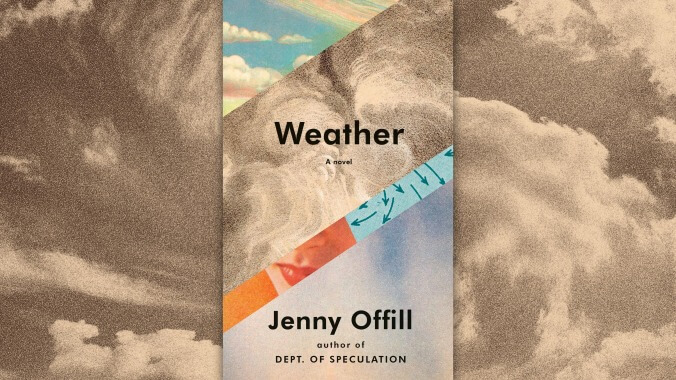Those who accept what is predicted to happen, what is, in fact, already happening, may worry more about surviving climate change than preventing it. But this doesn’t necessarily answer the question of what to do in the meantime. In Jenny Offill’s new novel, Weather, global warming is the problem, but so is the anxiety that comes from living under its impending shadow.
Days go on despite the growing unease—Lizzie hosts a playdate for her son, attends meditation classes, fools around with her husband—but when disaster is imminent, even a bum knee can ring like an omen. “Trump” is not a word Offill uses in polite company; pronouns and “after the election” suffice. Still, his arrival intensifies the narrator’s worries on matters both weather-related and not, making everything seem larger, faster, and worse. Anxiety doesn’t always lead to action, of course. Even Lizzie and her husband are deniers to some extent, especially when compared with experts like Sylvia; before decamping to the “darkest place in America,” she tells Lizzie that her best chance of survival is to become “very, very rich.”
Offill smartly anchors her story in conflicts that have little to do with climate change, but which complicate the way she sees both. Her imagined doomstead first includes her husband and son, though it’s her brother who takes up more and more of her time. In recovery for a pill addiction, Henry begins to unravel when his wife has a baby; so anxious he’ll hurt the newborn, he bathes her with a squirt gun. Lizzie saved Henry once before, and now, as then, he takes more from his sister than he gives.
“I have so many people, you wouldn’t believe it,” Lizzie says late in the novel. It’s true, she has a family and others who rely on her, though there’s something very normal about it all. Her situation is the kind so many are after—to be surrounded by those you care for and who care for you in return. What’s notable here is how imagining the end times throws into relief what we can and can’t do for others. Weather is a decidedly urban, middle-class book, and Lizzie’s people extend to her oddball library patrons, the bodega owner, the sleepless man who drives for her car service. People get help where they can, Offill seems to say. It doesn’t have to be from your sister.
Often more than any single grand idea, the pleasure of reading Offill is in her supreme attention to language and how precisely she unfolds her narratives. She never gives more than what is needed, and what she gives, for all her protagonist’s wryness, is often startlingly beautiful. “My mother calls and speaks to me of the light, the vine, the living bread,” reads one section in its entirety. Also: “The top of that tree is on fire. Or else it’s fall again.” And then there is this elegant summary of the confusing, often terrifying now: “There is a theory that new hate has been unleashed. Another that the amount of hate is exactly the same as it’s always been.” If Weather lacks the perfect focus of Speculation, it’s a matter of scale. The latter considers the end of a marriage; the former, the end of the world. What’s a little infidelity compared to that?
In Weather, Offill creeps. Plot is a slow and steady accumulation, akin to the frog-in-boiling-water metaphor so often used to illustrate climate change. Blink and you’ll miss the crisis’ first mention—“The moon will be fine… No one’s worrying about the moon”—but by novel’s end, you will know how to start a fire with a gum wrapper and a battery. If learning such a skill is the unfortunate result of the narrator’s dread, then writing this affecting, witty, sometimes hopeful novel is the author’s. It may not prove as useful in a catastrophe, but like so many things we now take for granted, we are lucky to have it.






















![Rob Reiner's son booked for murder amid homicide investigation [Updated]](https://img.pastemagazine.com/wp-content/avuploads/2025/12/15131025/MixCollage-15-Dec-2025-01-10-PM-9121.jpg)


















